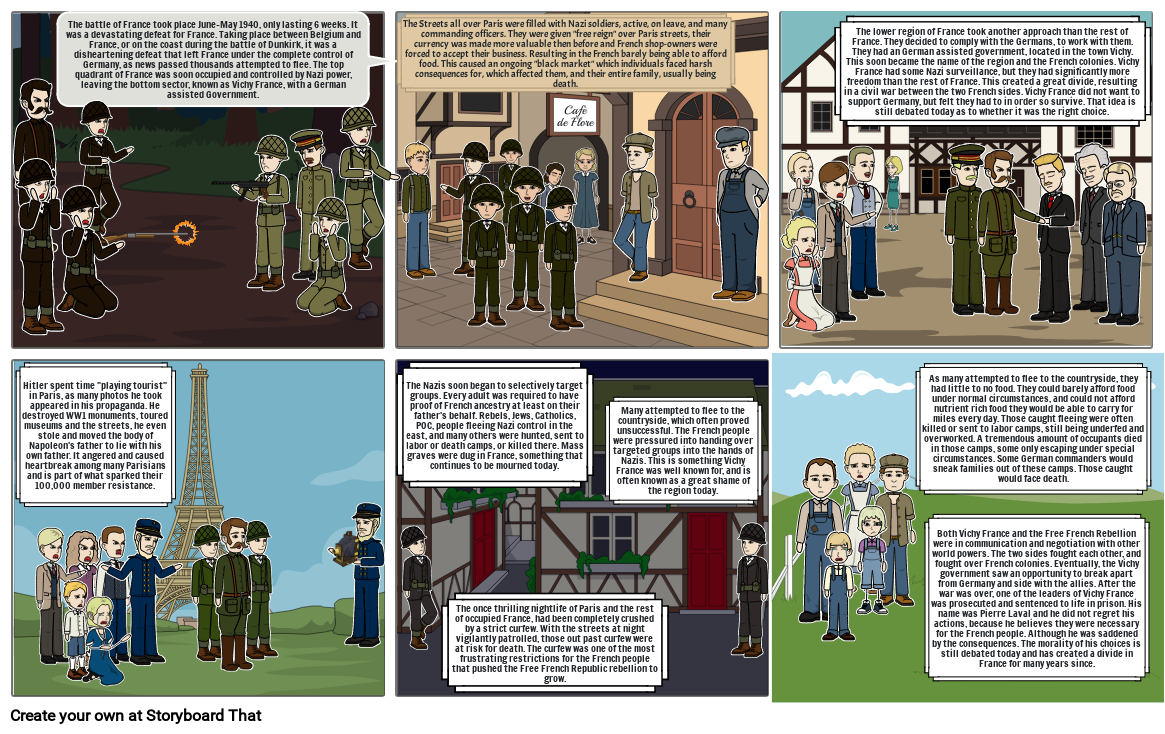Occupation of France

Texto del Guión Gráfico
- The Streets all over Paris were filled with Nazi soldiers, active, on leave, and many commanding officers. They were given "free reign" over Paris streets, their currency was made more valuable then before and French shop-owners were forced to accept their business. Resulting in the French barely being able to afford food. This caused an ongoing "black market" which individuals faced harsh consequences for, which affected them, and their entire family, usually being death.
- The battle of France took place June-May 1940, only lasting 6 weeks. It was a devastating defeat for France. Taking place between Belgium and France, or on the coast during the battle of Dunkirk, it was a disheartening defeat that left France under the complete control of Germany, as news passed thousands attempted to flee. The top quadrant of France was soon occupied and controlled by Nazi power, leaving the bottom sector, known as Vichy France, with a German assisted Government.
- Cafè de Flore
- The lower region of France took another approach than the rest of France. They decided to comply with the Germans, to work with them. They had an German assisted government, located in the town Vichy. This soon became the name of the region and the French colonies. Vichy France had some Nazi surveillance, but they had significantly more freedom than the rest of France. This created a great divide, resulting in a civil war between the two French sides. Vichy France did not want to support Germany, but felt they had to in order so survive. That idea is still debated today as to whether it was the right choice.
- Hitler spent time "playing tourist" in Paris, as many photos he took appeared in his propaganda. He destroyed WW1 monuments, toured museums and the streets, he even stole and moved the body of Napoleon's father to lie with his own father. It angered and caused heartbreak among many Parisians and is part of what sparked their 100,000 member resistance.
- The Nazis soon began to selectively target groups. Every adult was required to have proof of French ancestry at least on their father's behalf. Rebels, Jews, Catholics, POC, people fleeing Nazi control in the east, and many others were hunted, sent to labor or death camps, or killed there. Mass graves were dug in France, something that continues to be mourned today.
- The once thrilling nightlife of Paris and the rest of occupied France, had been completely crushed by a strict curfew. With the streets at night vigilantly patrolled, those out past curfew were at risk for death. The curfew was one of the most frustrating restrictions for the French people that pushed the Free French Republic rebellion to grow.
- Many attempted to flee to the countryside, which often proved unsuccessful. The French people were pressured into handing over targeted groups into the hands of Nazis. This is something Vichy France was well known for, and is often known as a great shame of the region today.
- As many attempted to flee to the countryside, they had little to no food. They could barely afford food under normal circumstances, and could not afford nutrient rich food they would be able to carry for miles every day. Those caught fleeing were often killed or sent to labor camps, still being underfed and overworked. A tremendous amount of occupants died in those camps, some only escaping under special circumstances. Some German commanders would sneak families out of these camps. Those caught would face death.
- Both Vichy France and the Free French Rebellion were in communication and negotiation with other world powers. The two sides fought each other, and fought over French colonies. Eventually, the Vichy government saw an opportunity to break apart from Germany and side with the allies. After the war was over, one of the leaders of Vichy France was prosecuted and sentenced to life in prison. His name was Pierre Laval and he did not regret his actions, because he believes they were necessary for the French people. Although he was saddened by the consequences. The morality of his choices is still debated today and has created a divide in France for many years since.
Más de 30 millones de guiones gráficos creados

